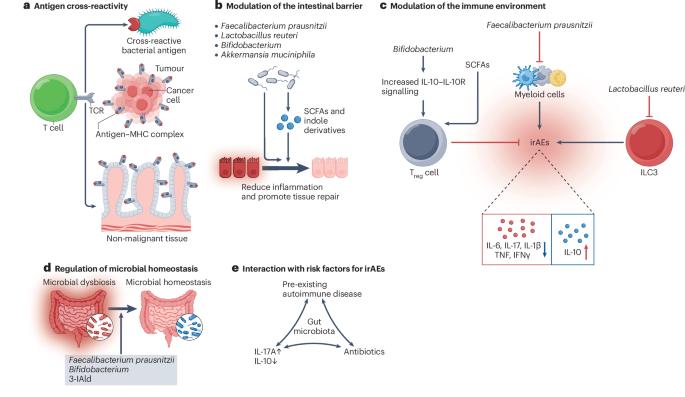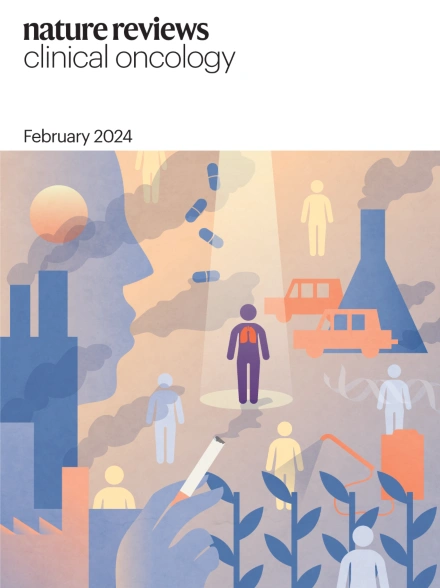肠道微生物群在免疫相关不良事件中的作用:机制和治疗干预
IF 82.2
1区 医学
Q1 ONCOLOGY
引用次数: 0
摘要
免疫检查点抑制剂(ICIs)是癌症治疗领域的重大突破;它们的使用改善了各种肿瘤类型的治疗效果。然而,ICIs可引起多种免疫相关不良事件(irAEs),这对这些治疗的有效性和安全性提出了相当大的挑战。肠道微生物群已被证明在调节肿瘤免疫微环境中起着至关重要的作用,从而影响ICIs的有效性。越来越多的证据表明,肠道微生物群组成和功能的改变也与irae风险增加有关,特别是ici诱导的结肠炎。事实上,肠道菌群的这些变化可能导致irae的发病机制。在这篇综述中,我们首先总结了目前irAEs所面临的临床挑战。然后,我们将重点放在已报道的肠道微生物群变化与irAEs之间的相关性,特别是ici诱导的结肠炎,并假设这些微生物变化影响irAEs发生的机制。最后,我们强调了肠道微生物变化作为预测irAEs的生物标志物的潜在价值,并讨论了可能作为irAEs管理新策略的肠道微生物干预措施,包括粪便微生物群移植,益生菌,益生元和/或后益生菌补充剂以及饮食调节。本文章由计算机程序翻译,如有差异,请以英文原文为准。


Roles of the gut microbiota in immune-related adverse events: mechanisms and therapeutic intervention
Immune checkpoint inhibitors (ICIs) constitute a major breakthrough in the field of cancer therapy; their use has resulted in improved outcomes across various tumour types. However, ICIs can cause a diverse range of immune-related adverse events (irAEs) that present a considerable challenge to the efficacy and safety of these treatments. The gut microbiota has been demonstrated to have a crucial role in modulating the tumour immune microenvironment and thus influences the effectiveness of ICIs. Accumulating evidence indicates that alterations in the composition and function of the gut microbiota are also associated with an increased risk of irAEs, particularly ICI-induced colitis. Indeed, these changes in the gut microbiota can contribute to the pathogenesis of irAEs. In this Review, we first summarize the current clinical challenges posed by irAEs. We then focus on reported correlations between alterations in the gut microbiota and irAEs, especially ICI-induced colitis, and postulate mechanisms by which these microbial changes influence the occurrence of irAEs. Finally, we highlight the potential value of gut microbial changes as biomarkers for predicting irAEs and discuss gut microbial interventions that might serve as new strategies for the management of irAEs, including faecal microbiota transplantation, probiotic, prebiotic and/or postbiotic supplements, and dietary modulations. The composition of the gut microbiota has been implicated as a key determinant of not only the clinical efficacy but also the immune-related adverse effects (irAEs) of immune checkpoint inhibitors. This Review describes the reported correlations between alterations in the gut microbiota and irAEs, as well as their potential underlying mechanisms and possible predictive utility. Gut microbial interventions that might serve as new strategies for the management of irAEs are also discussed.
求助全文
通过发布文献求助,成功后即可免费获取论文全文。
去求助
来源期刊
CiteScore
99.40
自引率
0.40%
发文量
114
审稿时长
6-12 weeks
期刊介绍:
Nature Reviews publishes clinical content authored by internationally renowned clinical academics and researchers, catering to readers in the medical sciences at postgraduate levels and beyond. Although targeted at practicing doctors, researchers, and academics within specific specialties, the aim is to ensure accessibility for readers across various medical disciplines. The journal features in-depth Reviews offering authoritative and current information, contextualizing topics within the history and development of a field. Perspectives, News & Views articles, and the Research Highlights section provide topical discussions, opinions, and filtered primary research from diverse medical journals.

 求助内容:
求助内容: 应助结果提醒方式:
应助结果提醒方式:


